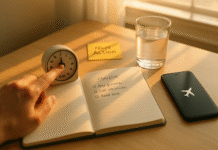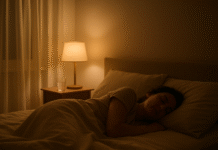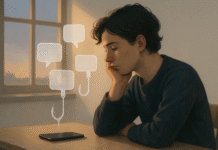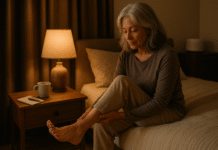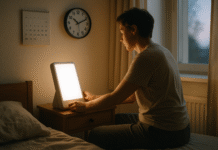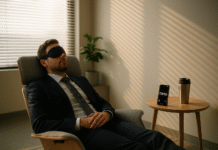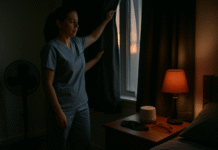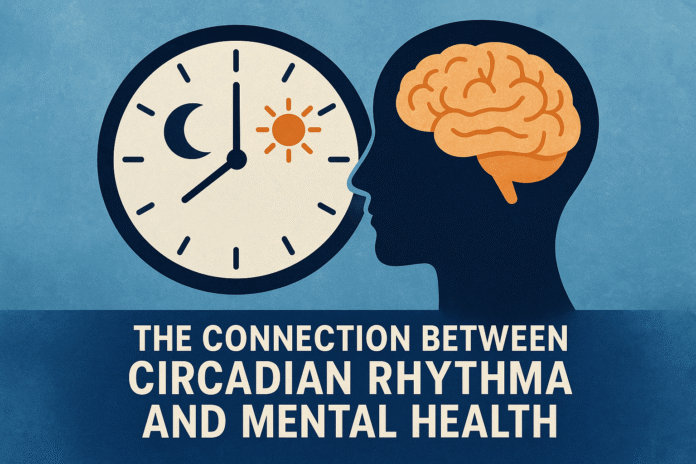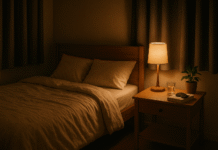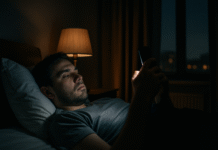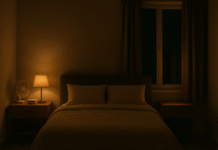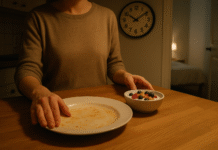The circadian rhythm is like an internal clock that instructs the body when to do practically everything, like release hormones and maintain the body’s core temperature consistent. A lot of us conceive of this 24-hour cycle as sleep and wakefulness, but more and more research reveal that it has a huge effect on mental health. This system is very well-balanced, and changes to it might make you feel bad, worried, or even make your brain perform less well. Taking care of your circadian rhythm, on the other hand, can help maintain your mind healthy.
Learning about your body’s natural sleep-wake cycle
What is the day’s rhythm?
The Latin term “circa diem,” which means “about a day,” is where the name “circadian” derives from. The built-in clock is controlled by the suprachiasmatic nucleus (SCN) in the hypothalamus. It largely reacts to light. The body’s circadian rhythm keeps things operating together in cycles that last approximately a day. This includes fixing cells and how genes are expressed.
Light, melatonin, and cortisol are the most crucial things. The SCN stops generating melatonin and wakes individuals up when it’s light outside.
- Melatonin: The pineal gland releases melatonin at night, which makes you tired and helps you fall asleep.
- Cortisol: levels go up fast when we wake up, which helps us start moving. During the day, they go down, but they go up a little in the evening to get us ready for the next cycle.
The Biological Mechanism: How Circadian Rhythms Affect Brain Function, Gene Expression, and the Balance of Neurotransmitters
“Clock genes” (such as CLOCK, BMAL1, PER, and CRY) produce proteins in a rhythmic pattern at the molecular level that governs how neurons behave. When these genes are not working right in animals, it impacts how they act and feel, which indicates how crucial they are for mental health.
The brain’s ability to change and the way sleep is structured
A healthy circadian rhythm helps you receive both REM and deep slow-wave sleep, which are both crucial for remembering things and dealing with your feelings. Chronic misalignment, such as working shifts or not getting enough sleep, can make neural plasticity less effective, which can cause sadness and anxiety.
Controlling Mood and Circadian Rhythm
Bipolar Disorder and Major Depression
- Things to Look for If You’re Depressed: People with major depressive illness generally have a delayed circadian phase, which means they go to bed and get up later and their cortisol levels aren’t as sensitive.
- Bipolar cycling: Rapid changes in sleep patterns can lead to manic or depressed episodes. Getting your sleep and wake times back on track is one of the most crucial components of mood stabilization treatment.
How to Handle Stress and Worry
Not getting enough sleep makes your amygdala more susceptible to stress, which makes your anxiety worse. Having a regular circadian rhythm, on the other hand, lowers the levels of stress hormones in the body and makes it stronger.
Cognitive Function and Neurodegeneration
Long-term circadian disruption is linked to reduced executive function and may accelerate neurodegenerative processes seen in Alzheimer’s disease, where sleep abnormalities might precede cognitive symptoms by many years.
Mental health problems and issues
- Shift work: 40% more likely to be depressed; more likely to be nervous and use medications
- Jet Lag: Mood swings that don’t stay long; problems with your thoughts
- Jet Lag in Your Social Life: If you change your sleep routine on the weekends, you might feel exhausted all the time and your attitude might change.
- Too much time spent in front of a screen: Blue light at night suppresses melatonin levels, which might make you feel sad and make it hard to sleep.
Clinical investigations investigating Chronotherapy in Depression indicate that exposing treatment-resistant individuals to strong light (10,000 lux for 30 minutes) in the morning exacerbated their depressive symptoms by 60%.
Melatonin Agonists: Agomelatine, a melatonin receptor agonist and serotonin antagonist, showed high rates of remission in major depression trials, notably in people with severe insomnia.
Sleep-Wake Scheduling: Randomized trials suggest that persons with bipolar disorder who have set times to go to bed and wake up are 35% less likely to suffer a relapse in a year.
Things You Can Do to Help Your Circadian Rhythm Get Back on Track
A. When to go to bed and when to wake up every day
Every day, even on the weekends, go to bed and wake up at the same time.
B. Getting Some Sun in the Morning
Get outside for 20 to 30 minutes within an hour of waking up.
Use a light treatment box when it’s dark outdoors.
C. A technique to unwind before bed every night
Turn off any blue light-emitting devices and the lights at least one to two hours before bed.
Meditation, reading, or practicing some mild yoga will help you relax.
D. Going to bed on purpose
If you nap after 3 PM, it will mess up your body’s natural sleep-wake cycle.
When to Drink Alcohol and Stimulants
After 2 PM, don’t drink coffee.
Don’t consume a lot of alcohol, and don’t drink it three hours before you go to bed.
Using your body to do things
Do some activity in the morning, but not too much before bed.
Care that is both medical and technical
- Light Therapy and Chronotherapy:
- Dawn Simulators: Slowly make the light in your bedroom brighter in the morning.
- Evening Phase-Advancing Lamps: These lamps help those who stay up late move their circadian phase forward.
- Digital tools and wearables:
Even if you’re in light slumber, smart alarms might wake you up.
You can use apps like ReTimer and Entrain to set your own light and activity regimens. - Help with medicine:
Taking melatonin supplements for a brief time (0.5 to 5 mg) can help with phase delays.
For issues that endure a long duration, a doctor administers melatonin receptor agonists.
Opinions from experts and case studies
“Getting my sleep patterns back to normal made me feel better than any medicine alone.”
—Patient A, 28, has bipolar II disorder.
“We found that circadian metrics were better at predicting relapse than symptom checklists.”
—Dr. Miguel Santos, psychiatrist of the Sleep and Mood Disorders Unit.
- Chronobiomics: Combining genetic, proteomic, and metabolomic data to improve the effectiveness of circadian therapies.
- Neuroimaging of Circadian Centers: New MRI techniques that let us view how the SCN works in real time.
- Personalized Chronomedicine: Algorithms that integrate information from wearables and clinical profiles to figure out the optimal times for therapy.
In the End, Thoughts
There is a strong and intricate link between circadian rhythm and mental health. Changes to our internal clock can make mood problems, anxiety, and cognitive decline worse. By making changes to their lives based on research, employing light and chronotherapeutic treatments, and, if necessary, taking medication, people can bring their circadian rhythms back in sync and feel better mentally.
As research moves closer to personalized chronomedicine, the possibility for better and more tailored therapies grows. You still need to wake up and go to bed at the same time every day, receive some light exposure, and know what you do at night. Not just what you do during the day might harm your mental health. It also relies on how effectively you can keep up with how your body works on its own.
Frequently Asked Questions
- What is the day’s rhythm?
The suprachiasmatic nucleus (SCN) in the brain controls the circadian rhythm, which lasts around 24 hours. It controls the release of hormones, the body’s internal clock, the body’s temperature, and other important activities. - Is it possible for a disturbance in your circadian rhythm to make you sad?
Yes. Studies reveal that misalignment, which can happen when sleep patterns aren’t regular, can make depressed symptoms worse or even initiate them by messing up the balance of neurotransmitters and stress chemicals. - How does light therapy help patients with mental health issues?
In the morning, bright light suppresses melatonin levels, which impacts how you sleep. This impact can help with seasonal affective disorder (SAD) and depression that isn’t seasonal if you do it for 20 to 60 minutes every morning. - Is it dangerous for your health to take melatonin pills for a long time?
It is usually safe to use for a short time. Scientists are still attempting to figure out what will happen in the future, though. It works best when a doctor recommends you to take it, and you should take it in modest dosages (0.5–3 mg) at the correct times. - What part do genes play in mental and circadian health?
CLOCK, BMAL1, PER, and CRY are clock genes that work together to control circadian rhythms by making molecular feedback loops. People are more prone to have mental disorders if certain genes change or have abnormalities. - How long will it take for my body’s natural sleep-wake cycle to get back on track?
It normally takes 3 to 7 days for a new pattern to establish in, and the changes occurs over time (10 to 15 minutes earlier or later each day). If you change your plans fast, you are more likely to feel tired and have mood swings. - Does using social media at night mess up the way my body naturally wakes up and goes to sleep?
Yes. Screens that give out blue light lower levels of melatonin, which makes it harder to fall asleep and can make sleep less peaceful. This is negative for mental health.
References
- National Institute of General Medical Sciences. “Circadian Rhythms Fact Sheet.” NIH. https://www.nigms.nih.gov/education/fact-sheets/Pages/circadian-rhythms.aspx
- American Academy of Sleep Medicine. “Melatonin and Sleep.” AASM. https://aasm.org/resources/factsheets/melatonin.pdf
- Weitzman, E. D., et al. “Twenty‐Four Hour Pattern of Cortisol Secretion in Normal Subjects.” JCI, vol. 52, no. 11, 1973, pp. 2685–2700. https://www.jci.org/articles/view/108084
- Zhang, R., et al. “A Circadian Gene Expression Atlas in Mammals: Implications for Biology and Medicine.” Proc. Natl. Acad. Sci. 2014. https://www.pnas.org/content/111/45/16219
- Stickgold, R. “Sleep‐Dependent Memory Consolidation.” Nature, vol. 437, 2005, pp. 1272–1278. https://www.nature.com/articles/nature04286
- Bunney, W. E., et al. “Circadian Dysregulation of Clock Genes: Clues to Rapid Treatments in Major Depression.” Mol. Psychiatry, 2015. https://www.nature.com/articles/mp2015147
- Grandin, L. D., Alloy, L. B., & Abramson, L. Y. “The Social Rhythm Stability Study: Social Rhythms as a Predictor of Relapse in Bipolar Disorder.” J. Abnorm. Psychol., 2006. https://psycnet.apa.org/fulltext/2006-03103-004.html







